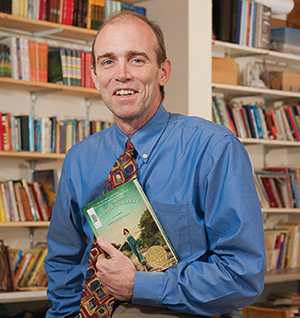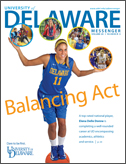No Kidding
Selecting best children's books is serious business

ALUMNI | Last year, Brian Fahey, AS89, probably read more children’s books than most kids will come across in a lifetime.
Fahey, who teaches reading, social studies and math to fifth-graders at Wilmington Friends School in Delaware, served as a member of the 2011 Newbery Medal committee. Each year, a 15-member committee chooses the winner of the prestigious medal, honoring the author of the most distinguished contribution to American literature for children by a U.S. publisher during the preceding year.
“I was nominated for appointment by K.T. Horning, a professor at the University of Wisconsin who is the director of the Cooperative Children’s Book Center in Madison,” says Fahey, who majored in political science and English at UD and now is finishing his thesis for the Master of Arts in Liberal Studies program. He says committee members all receive boxes of the same books but may read them in whatever order they prefer.
“Starting in March, we make anonymous recommendations by submitting a list of titles to the chair of the committee,” Fahey says. “Members use the list as a guide, but they also read books not on the list so as not to miss a worthy book and to ensure a wide range of reading.”
Following mock discussions in June to get a feeling for committee protocol as prescribed in the committee manual, formal nominations are presented in October, November and December. Books and more books continue to arrive until early December, allowing for the possibility of a last-minute nomination before the committee meets in January, when the list is winnowed down and final voting takes place.
“Everything has to be wrapped up by the final Sunday morning of the January meeting,” Fahey says. “On Monday morning we meet early to call the authors, which is really fun. This happens just before the awards are announced publicly.”
Having looked at some 350 books, Fahey says he closely read and took extensive notes on about 150. He read each of the final 75 books on the list at least twice, he says, reading some four or five times before making his final decisions.
“My favorite book was Moon Over Manifest by Clare Vanderpool (Delacorte Press), which won the Newbery Award,” Fahey says. “I read it early on in March, and it remained my favorite all the way through.”
His other favorites included Dark Emperor and Other Poems of the Night by Joyce Sidman (Houghton Mifflin Books for Children) and Turtle in Paradise by Jennifer L. Holm (Random House Books for Young Readers), both of which earned Newbery honors.
Fahey says the ultimate critics, including students in his classes at Wilmington Friends, tend to be especially interested in the latest books in a genre.
“They read all the time, and I have a hard time keeping up with them,” he says. “The new addition to school life is the e-reader, and lots of kids are using them now.”
His personal preferences tend to be books that have an interesting problem to be solved, as well as characters with plenty of heart.
“I like books that challenge the reader,” Fahey says. “These are the ones that make readers use their imagination to fill in some of the blanks for themselves.”
Article by Jerry Rhodes, AS04






